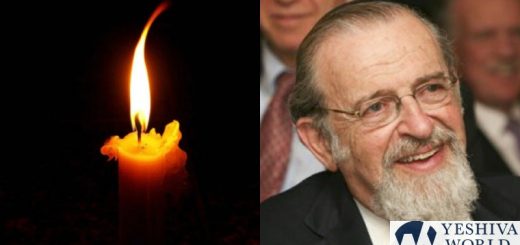It Looks Like I’ve Got Some Explaining To Do – A Friendly Reply to Dr. William Kolbrener

The past day has been for me one of uneasiness and preoccupation. Although it was not at all my intent, I perceived from Dr. William Kolbrener’s tweets and Facebook posts that I had offended him or come across as brash with my article of late yesterday – yet I awaited his “official” response before taking to the keyboard and reaching out with some friendly clarification. I firmly believed that my article was not at all a personal critique and that it constituted a debate of issues l’shem shamayim – such was my aim; however, the article obviously did not come across that way, for which I apologize and seek the opportunity to explicate my intent.
Below are some technical clarifications, after which I hope to take a step back and make a few general observations:
- Dr. Kolbrener felt that I asserted that he, “as a literary critic and Yeshiva University outsider”, is unfit to provide insights into the persona and thoughts of Rav Soloveitchik, for only the Rav’s “closest disciples and most accomplished students” are qualified to depict him and comment on his ideas. Such was not at all my intent, and I apologize for the impression that I was mandating an insider or elitist (for lack of a better term) qualifier. My intent was that in order to understand and present the gestalt of the Rav, one needs to consult with his closest disciples, who can provide paramount and dispositive information and perspectives that are not readily available to a reader of the Rav’s philosophical writings. I did not at all intend to claim that only the Rav’s close talmidim have the right to explain his ideas and significance, and to exclude Dr. Kolbrener or anyone else from doing so.
- I gave the impression that Dr. Kolbrener’s work is the product of studying Rav Soloveitchik merely from the perspective of a handful of his books and articles. Dr. Kolbrener draws upon a very broad array of the Rav’s material, both penned by the Rav as well as by others who knew him well. My intent was merely that the Rav’s philosophical writings should not be the primary lens through which he is viewed. But I did not convey this well, and I did not mean to detract in any way from the validity of Dr. Kolbrener’s studies and insights.
- Dr. Kolbrener writes: “I would say it is impossible to entertain R. Gordimer’s own contrarian postulate that R. Soloveitchik dismissed the disciplines of Western culture, as somehow a merely utilitarian accessory without intrinsic merit.” I heartily agree, and if I implied otherwise, I take it back. That said, and not opposing anything Dr. Kolbrener affirms in his response, Rav Soloveitchik did utilize his philosophical and general academic knowledge to elucidate hashkafic axioms, and he rejected secular scholarship which conflicted with Torah values, as is seen repeatedly throughout his public derashos and shiurim.
- Dr. Kolbrener writes: “R. Gordimer may object to the title of my essay, ‘Killing Off the Rav'”. Dr. Kolbrener also implied in a tweet that I attacked his essay’s language by referring to it as “attention-grabbing and sensationalist”. I did not intend to denigrate the essay’s language, as I knew the context and purpose of employing such terminology. My emphasis was that the wording was hyperbolic, aimed to seize readers’ attention. Such is not a criticism, and I apologize that it was taken as such.
- Dr. Kolbrener writes: “In the letter from which R. Gordimer selectively quotes, R. Lichtenstein concludes by disapproving of a species of that lack of complexity – with ‘the shallowest cut of all’ being ‘the attempt to pigeonhole the Rav within the confines of a current narrow “camp.'” I quoted the punchline (specific to the Edah issue) of the Rav Lichtenstein letter in order to demonstrate the core “rosh yeshiva orientation” of the Rav, and not to diminish from the complex totality of his persona and thought. My intent was not to excise part of the Rav’s comprehensive and broad identity and outlook.
Rav Soloveitchik’s halachic and hashkafic prowess and his stature as one of the most preeminent ba’alei mesorah of the past century, whose legacy so profoundly impacted Jewry on multiple levels, will leave a massive footprint, whose breadth and depth we probably cannot yet grasp or even ponder. His striking brilliance and profound intuition, coupled with his appeal for all Jews to engage in Torah (he explained that Talmud Torah is a very democratic system – all are invited to learn, and pedigree plays no role in Torah greatness), opened up treasure troves of knowledge and insight and offered something to everyone.
As much as I have gained from the halachic teachings of the Rav, as conveyed to me by my rebbeim and others, and as much as I am a voracious consumer of the Rav’s published shiurim and derashos, my personal, intellectual and spiritual growth have been seismically impacted by the Rav’s epistemological and ideological writings and emotional expression. Dr. Kolbrener’s quest to draw forth new and deeper insights from the Rav can only lead to a greater cultivation and development of these crucial and ever-so-needed riches.




A lot of misunderstandings can be settled over a beer.
Rabbi, i frankly am left confused when you write: “My intent was that in order to understand and present the gestalt of the Rav, one needs to consult with his closest disciples, who can provide paramount and dispositive information and perspectives that are not readily available to a reader of the Rav’s philosophical writings. I did not at all intend to claim that only the Rav’s close talmidim have the right to explain his ideas and significance, and to exclude Dr. Kolbrener or anyone else from doing so.”
I am left wondering about three specific things.
1) are “closest disciples” and “close talmidim” the same or similar people? I would think. I count the late Prof. Wurzberger, Dr. Lamm (may God grant him a refuah shelaimah), Julie Berman, etc. in the former category and the late Rabbi Kanotopsky, Rav Schechter, etc. in the latter category. A precious few individuals spanned both categories.
2) Familiarity with an individual as a devoted disciple, talmid, relative, etc. and the ability to analyze his total weltanschauung may not be the same. Often one, who can look back with a broader perspective, can discern what is obscured to those close who interacted directly. Various biographies of Gedolim written long after their passing often provide deeper insight than those given by contemporaries. Indeed the insights of contemporaries are critical important source material, but often lack the perspective that an objective, more distant observer can provide.
3) Is it breadth, depth or both that is most valuable or does it matter? To be specific is the exceptional talmud class student or one who fully appreciates the Halakhic Mind or a less accomplished student able to straddle both the shiur and the philosophical writings best able to represent the Rav ztl? I suspect that all three might provide different perspective. Which is most valuable is less critical than the recognition that all three are necessary.
Dr.:
1. I would include both groups of people.
2. Yes, but getting a firsthand-type of feel for the person via his confidants is surely an important tool in assessing him at any level or time period.
3. All three are very helpful. But lack of the first two types would likely hinder a proper appreciation.
Rabbi, It appears that bob miller is correct. With only differences on matters of stress, i agree with you in the three areas.
I don’t understand your distinction between close disciples and close talmidim. I don’t want to compare ndividual capabilities- but of interest is how you determine close talmidim or close disciples. Is it on the basis of what titles you give them. is it on the basis of what they did later thus both Rabbis Schechter and Kanatopsky later taught Talmud in RIETS does that make them better talmidim than their contemporaries. Both BTW were very good talmidim of the Rav.
I was somewhat subjective in my categorization. the two talmidim were so recognized by their peers in shiur. the three disciples had unique relationships often covering diverse issues across a large number of years, sometimes acting (openly and / or privately) on the Rav ztl’s behalf in various forums or situations, occasionally offering an opinion for the Rav to consider, etc. I am sure that the former for good reason have no hesitation conveying the Rav as they have observed him. the latter, have been more circumspect about discussing matters publicly.
Dr Bill
i do not want to engage in discussing who were the best students in a shiur 75 years ago. Suffice it to say very few if any are not in the Yeshiva Shel MAala. Since your listing appears to be similar to an ex HS Rebbes list who also came after the people you refer to I’ll assume it came from him. My objection to categorization is that one is rating people, and they all were alive when you wer at Yeshiva and thus likely that you at least spoke to them. I suspect you neither spoke to any of them outside their area of what they were at Yeshva for. His, I doubt you spoke to RAbbi KAnatopsky on math he won the math prize in his graduation year. There are people like you who won the Talmud prize , it is unlikely since you did other things thatcontemporaries who worked as Klei kkodesh would now remember you as number one in Talmud similarly, there are many Rabbis from the 40s to the 60s who either won the Talmud prize in graduating YU or/ and were the featured speaker at their Chag hasmicha and later did other things rather than be a RY. Reading the list of who were those people might surprise you.
I would agree with Dr Bill’s comments and suggest that a survey of who won the Talnud Prize in any particular year would make an interesting subject for a book on how much the awardee remained faithful to what he learned .
my purpose in the Talmud prize is not for who is faithful but to show how just because one gives lectures with factual mistakes, generally not ideological then history is taken as true because people don’t check. Since the Rav chose at least the early winners of those prizes when he was there it is a fair test of who at least the Rav treated as students.
i basically disagree with Dr Bills approach, there are close talmidim, some of them the Rav encouraged to receive advanced secular education which became part of what they used while dealing with issues that the Rav was concerned with. I have wondered recently did the Rav anticipate and plan using some of these people for certain specialties when he encouraged them to get advanced knowledge. I don’t know.
Would not receiving such an award be evidence not just of ones intellectual erudition in Talmud but also of what RYBzs expected of the recipient of a talmid?
Perhaps, but certainly one could not say the Rav did not believe that the person was at least as good a talmid as everyone else in the shiur.